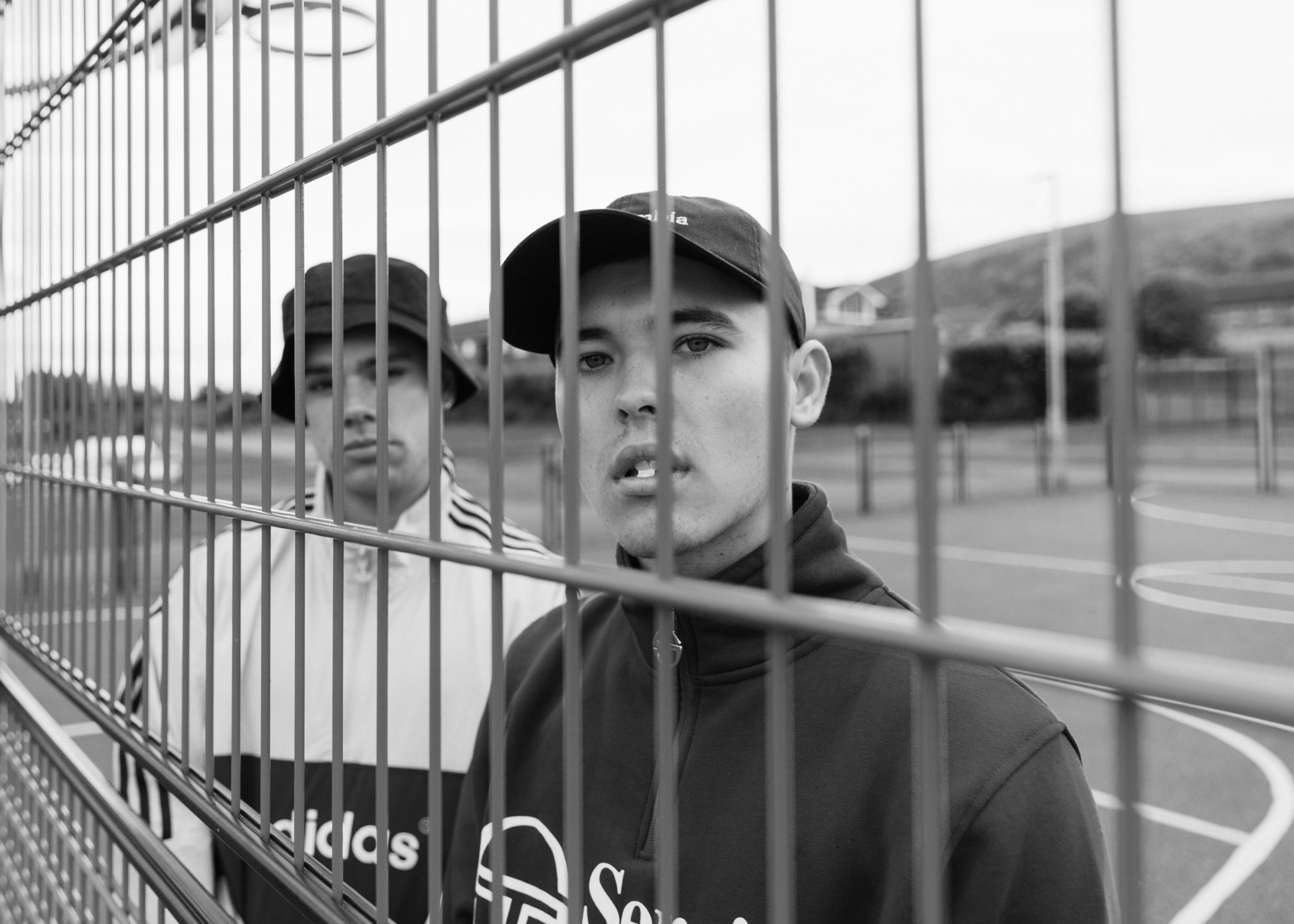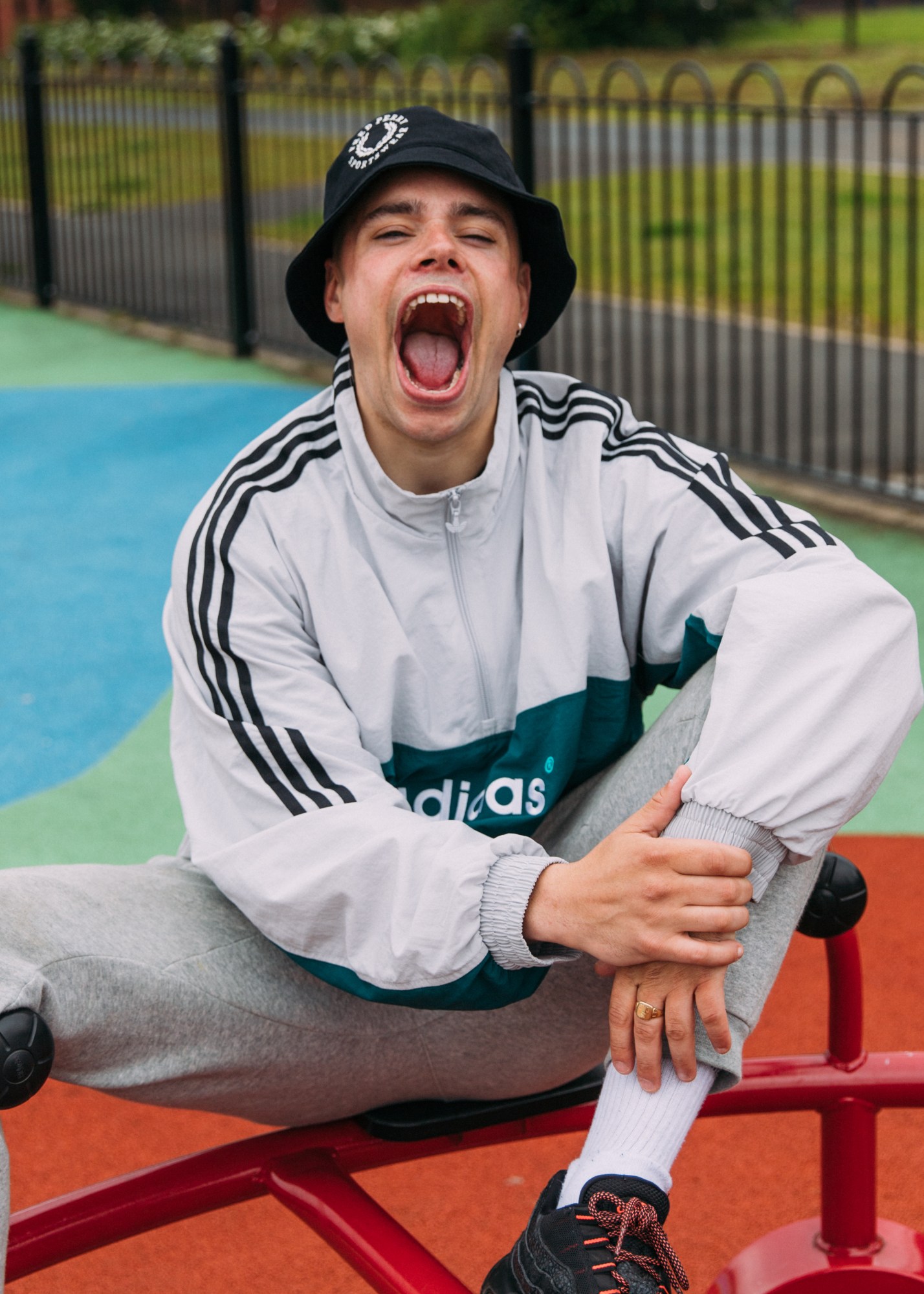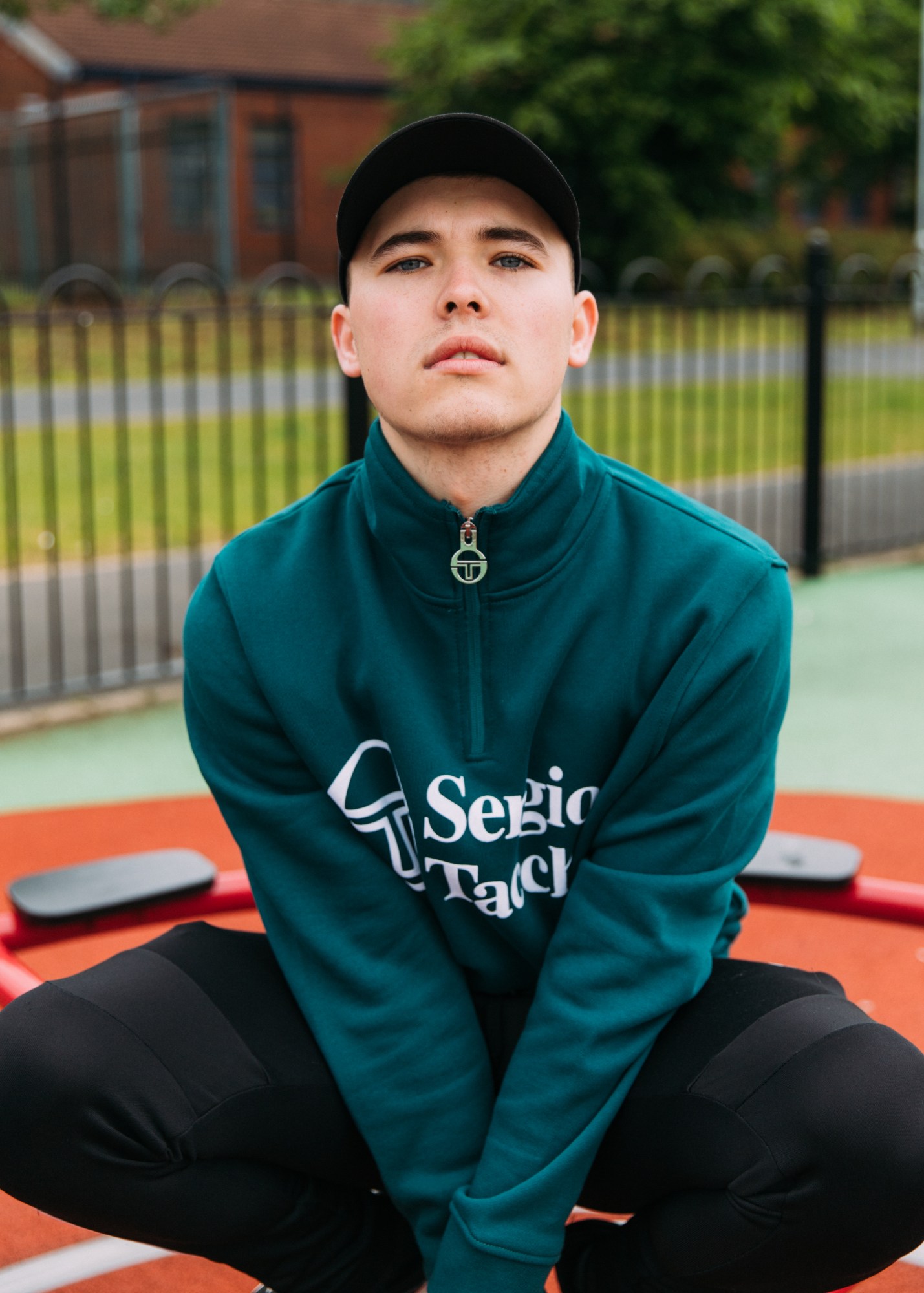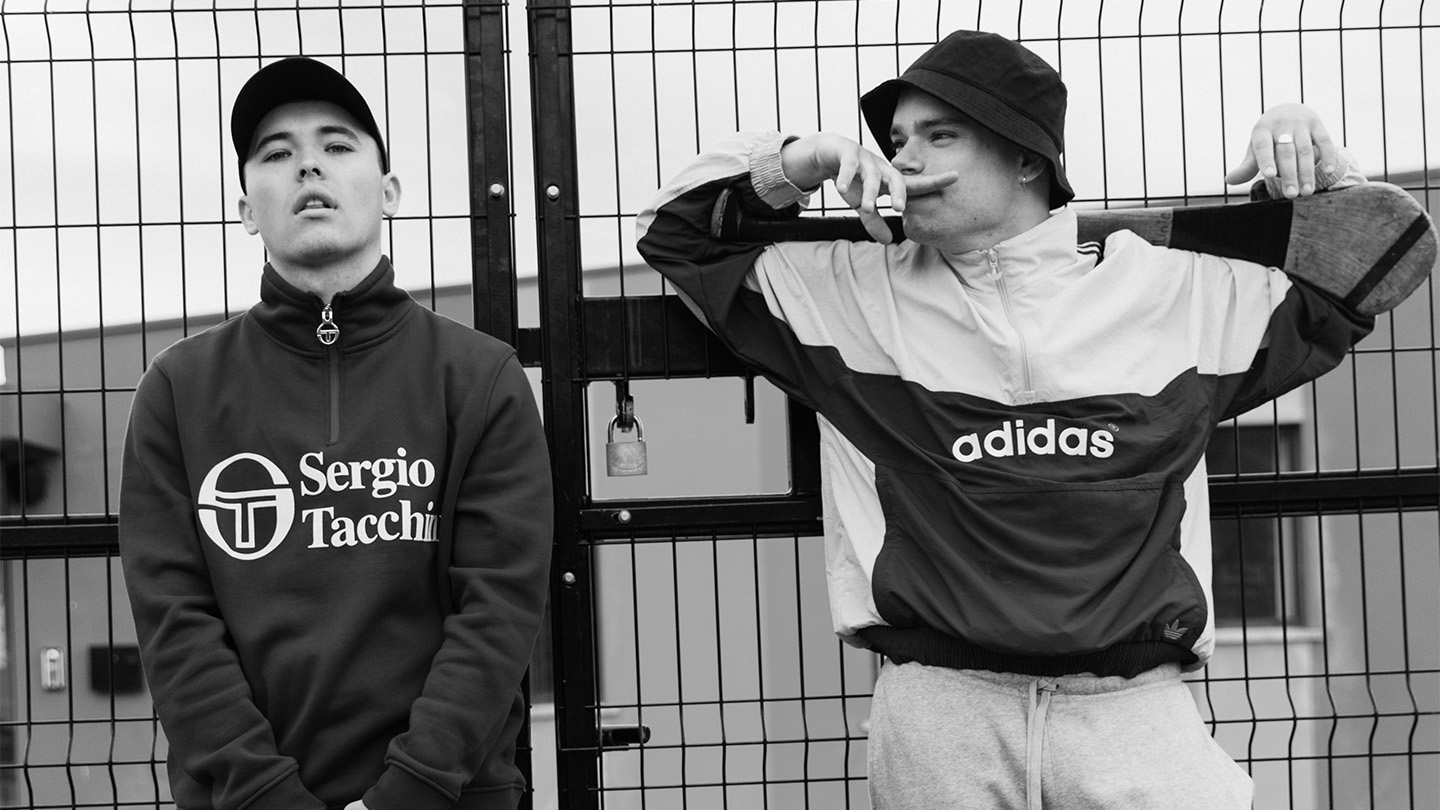The Irish music scene, it’s fair to say, was once not particularly diverse. A sea of four and five piece white indie bands singing acoustic love songs in English and American accents, it didn’t inspire much excitement. But in the past few years the scene has exploded and diversified more than ever before, particularly when it comes to rap and hip-hop. In the south, Alex Anyaegbunam, better known by his stage name Rejjie Snow, has gained global popularity and iTunes chart-topping releases, while fellow Dubliner Kojaque, a member of the collective Soft Boy Records, famous for concept albums about the great Irish tradition of the deli counter, is about to embark on a nationwide tour. And in the north, unlikely west Belfast rappers Kneecap are leading the charge.
The trio — Mo Chara, Móglaí Bap and DJ Provaí — connected after meeting at parties. Now they write and produce together, with Mo Chara and Móglaí Bap performing (DJ Provaí moonlights as a teacher, so…). Since forming the collective in 2017, they’ve already sold out shows and been banned from local radio stations. What sets Kneecap apart from many other Irish hip-hop acts garnering popularity in the scene right now, is that they rap almost exclusively in Irish. Despite it being an officially recognised minority language in the region a 2011 census found that only 10.65% of citizens have some knowledge of Irish. But Kneecap won’t be switching to English any time soon.
“We always spoke Irish to each other, so it seemed normal to make music in the language we spoke,” explains producer, lyricist and performer Móglaí Bap. “We didn’t even think about it as a deliberate thing. It’s our first language, so it seemed natural to make music in Irish too.”

C.E.A.R.T.A — Irish for “right” — Kneecap’s breakout hit, sees Móglaí Bap and Mo Chara rapping about a real life experience that set their musical dreams in motion. In 2017 Móglaí, who raps under a pseudonym (duh) and doesn’t give out his real name, was caught graffitiing a wall in Belfast City Centre by undercover police. “We just write about things that have happened to us,” Mo Chara explains. “Then we come back with our lyrics, show it to each other, check if it’s shite or not.”
They also appear unapologetic about how their songs, which touch on controversial subject matter, have been received. After a recent gig in Belfast’s Empire Music Hall, DUP politician Christopher Salford called the act “hate-filled”, after crowds chanted “Brits Out” when they finished playing. A newsnight report on the gig that night said: “A Belfast band has been condemned for chanting anti-British slogans at a Belfast bar where Prince William had spoken 24 hours previously. The incident happened at the Empire bar in south Belfast and has been criticised by the DUP.” Móglaí brushes off the criticism from the ultra-conservative political group. “It’s the DUP, like”, he says. “I mean, they’re criticising something new every week.”
This isn’t the only political acrimony they’ve ignited recently. The band also had problems in the south of Ireland. During a gig at University College Dublin the group were thrown out by bouncers who objected to their performance. RTE — Ireland’s national broadcaster — also banned the group from their radio stations, after realising that despite rapping in Irish, Kneecap’s lyrics were less than patriotic. “We kind of expected it,” the rapper laughs. “Everything that came before us in Irish was so radio-friendly, and we’re like nothing that’s come before. When we first put out music we had local politicians and stuff sharing it and praising it, going ‘oh this is Irish language hip-hop, this is great’, but they weren’t bothering to actually listen to it or translate what we were actually saying. Nobody was looking at it deeply enough to go, ‘oh here maybe we shouldn’t be sharing this!’”

Lyrically, the band explores much of the same subject matter as their English counterparts. But it’s not to be taken too literally. “We obviously come across as quite serious in our performances and our lyrics, but because acts like The Rubberbandits [an Irish comedy hip-hop duo] were there before, people understand us a bit more, our persona is more accepted,” he says, distancing himself from the criticism of their incendiary lyrics and on stage personas. “I suppose it’s a fine line. We have characters, but it’s difficult, because it comes from somewhere and we write what we know. It’s satire and it’s not. The art’s in the not knowing. We can be serious but we obviously try to put a spin on stuff and have a bit of craic — things in the North can be a bit too serious.”
The group’s memeification of paramilitary imagery has become one of the calling cards for the humour of Northern Ireland’s so-called Ceasefire Babies, a generation who grew up in the 90s and 00s, too young to remember the country’s violent past, but keen to trivialise it and laugh about it on Twitter all the same.
In their songs, Kneecap simultaneously lampoon and embrace the denunciation of their identity as working class young men from west Belfast. In a recent, rare English-spoken line in their song H.O.O.D. they yell intermittently “I’m a H.O.O.D / low life scum / that’s what they say about me.” In their video for Interlude they take inspiration from The Rubberbandits, mocking the hypocrisy of anti-drug paramilitaries. “The song is an exaggerated reflection of youth culture,” explains Tomaí Ó Conghaile, former editor of Nos. “Irish has been considered outdated and very traditional. A lot of people have done rap and hip-hop in Irish, but nothing has been this controversial.”

In spite of all the criticism though, what you can’t deny is that Kneecap are at least creating a long overdue buzz around the Irish language. As Tomaí Ó Conghaile says, Irish music and the language itself has long been considered outdated and old-fashioned. Kneecap though, are proving that the Irish language doesn’t need to be consigned to the status of ‘dying language’ — something associated with rainy trips to the Gaeltacht and folk musicians in Aran jumpers. It makes sense for them to perform in their first language, and they’re coming to prominence at a time when finally, English as standard in the music industry is being challenged. Last year, Despacito spent 16 weeks as Billboard’s number one, despite being completely in Spanish. In May, K-pop superstars BTS became the first Korean band to headline Wembley Arena, with a sold out show. The band have spoken out previously about the importance of staying true to their Korean roots, which has even led to a subculture of ‘fan translators’, helping their BTS Army to understand the content of the songs they love so much. If language barriers which placed English as the norm once divided pop culture, those barriers might finally be coming down.
“It doesn’t really make sense to have to stick to one way of speaking or one language,” Móglaí Bap finishes with. “We jump from one to the other all the time. Language is fluid, know what I mean?”
Credits
Photography Vanessa Ifediora.

